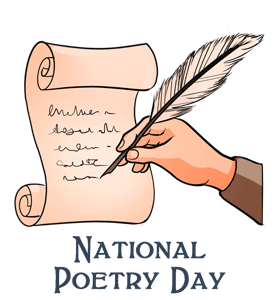

National Poetry Day
National Poetry Day Quick Facts
| HashtagsCompiled on | #Poetry |
|---|---|
| Related Hashtags | #Poetrycommunity, #Poem, #WritingCommunity |
| 2023 Date | 5 October 2023 |
2023 Holidays & Dates
| UK & Common Holidays | ||
| Misc. & Int'l. Observancesℹ | ||
| Christian Holidays | ||
| Jewish Holidays | ||
| Muslim Holidays |
|
|
|
|
